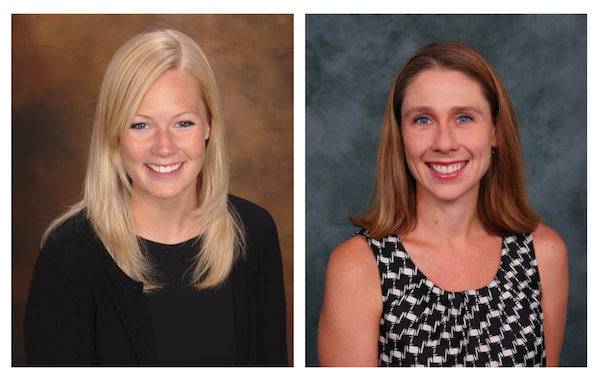Jaclyn Stephens and Arlene Schmid, two professors and researchers in the Department of Occupational Therapy, have teamed up to conduct a new, foundational study that will lend support to yoga as a therapy for physical disabilities and chronic brain injury.
Stephens, a newly named 2022 Boettcher Investigator, received grant funding in June from the Boettcher Foundation’s Webb-Waring Biomedical Research Awards Program for the study, titled, “Evaluating yoga intervention-induced changes in performance and neurophysiology in adults with chronic brain injury.”
With two years of grant funding, Stephens and Schmid plan to use brain imaging technologies to advance the scientific understanding of yoga therapy for adults with chronic brain injury. Currently, yoga is not widely available for the treatment of chronic brain injuries or disability, due to limited – albeit promising – empirical support.
Mind-body disconnect
The study’s design includes examining a participant’s brain before and after a yoga intervention, using non-invasive imaging technologies, such as functional magnetic resonance imaging and functional near-infrared spectroscopy, to evaluate if brain structures and functions change through the practice of yoga. Both fMRIs and fNIRS enable the team to look across neural networks and brain regions to understand why physiological behaviors, such as balance or proprioception, are improved through the practice of yoga.
At present, few yoga studies have focused on people with brain injuries, despite the benefits it could provide to those who are “struggling to connect the mind and body,” Schmid explained. “Most yoga research is for young, healthy adults and shows how we can change behavior, but individuals with brain injury can also benefit by being more mindful and aware.”

Schmid has been exclusively conducting yoga research for nearly 20 years and, in addition to quantifiable evidence, she has heard many anecdotal accounts from participants about a “mind-body disconnect,” as she calls it.
For example, after a traumatic injury, stroke patients may not be able to move a certain body part like they once did, and the newfound disability can cause them to become angry and resentful at their body for its loss of function. Schmid has observed these same participants report improvements in their relationship to their bodies by practicing yoga, often allowing for enhanced recovery.
Clinical support
Despite promising preliminary findings, yoga research needs more clinical studies to move support for yoga therapy from qualitative, self-reported data to measurable, diagnostic evidence. Quantitative evidence is necessary for therapies, like yoga, to be respected by the medical community and to be covered by health insurance companies.
Scientifically speaking, there is no way to measure a mind-body disconnect because the mind is more or less an abstract concept. But, Stephens and Schmid are hopeful that brain imaging could provide insight on how changes in a participant’s brain structure and function are linked to improvements observed in the body.
Stephens and Schmid’s study, which will begin in the fall of 2022, aims to provide the beginning answers to the question of why yoga works.
“Everyone is susceptible to brain injury, which is a really scary reality, but if we can understand how the brain is injured and then recovers by completing studies like this, then we can make huge strides in science,” Stephens said.
Jennifer Atkins, the yoga instructor for Stephens and Schmid’s research, has long known the positive effects of yoga therapy, observed in the older adult participants at her yoga practice, Adaptive Yoga Specialist.
“I’ve seen how adaptive yoga can bridge the gap between the brain and a disability, and now we get to prove that,” Atkins said. “I’m honored to continue my collaboration with CSU and OT’s Jaclyn Stephens and Arlene Schmid in providing evidence for measurable physiological and neurological changes in those living with movement disorders.”
Powered by RedCircle
Years in the making
The researchers are extending this study after finishing a smaller feasibility study in Fall 2021 with support from the College of Health and Human Sciences’ Seed Grant Program and the Molecular, Cellular, and Integrative Neuroscience Program’s Programs of Research and Scholarly Excellence funding mechanism for human MRI pilot studies.
Matthew Hickey, research associate dean for CHHS, commends Stephens on her recent Boettcher Foundation award.
“The College of Health and Human Sciences is delighted to celebrate Dr. Stephens’ Boettcher grant,” Hickey said. “Dr. Stephens’ innovative work addresses important clinical questions for individuals with chronic brain injuries. She is a rising star, and we look forward to seeing the impact of her work.”
Interested volunteers can email Jaclyn.Stephens@colostate.edu to be notified when the study is recruiting participants. Once enrolled in the study, volunteers will be asked to participate in a research assessment that includes safe, non-invasive brain imaging, both before and after a free, eight-week yoga program.
To be notified of other studies related to aging and age-related conditions, interested volunteers can also sign up for the Healthy Aging Research Registry.
The Boettcher Foundation’s biomedical research grants program aims to support scientific innovation in Colorado by providing biomedical research funding for early career investigators at the state’s research institutions. Recipients of Webb-Waring Biomedical Research Awards, or “Boettcher Investigators,” are awarded research grants of $235,000, covering up to three years of biomedical research.